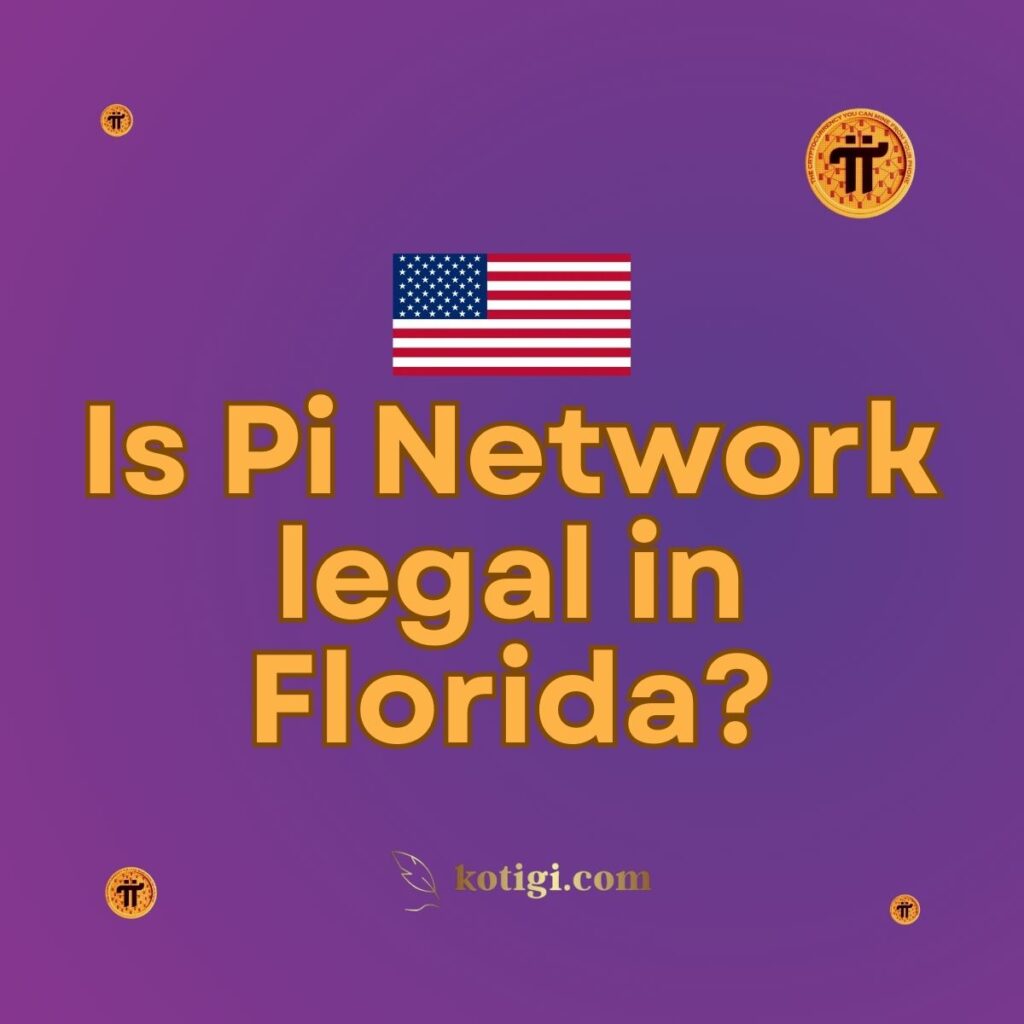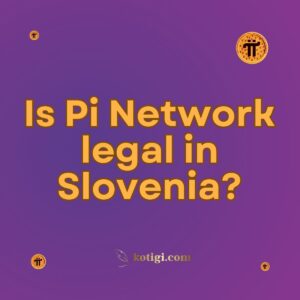
Is Pi Network legal in Florida?
Pi Network is currently legal in Florida. Although the state has no specific cryptocurrency regulations targeting Pi Network, Florida residents must still adhere to federal guidelines set by the IRS and SEC. Florida’s supportive stance on blockchain technology allows Pi Network to operate, but participants should remain informed about federal tax implications, security best practices, and potential regulatory updates.
Introduction
With the rise of digital currencies, residents of Florida are increasingly curious about the legal status of platforms like Pi Network. Pi Network, which enables mobile-based cryptocurrency mining, operates differently than traditional digital currencies, and its unique model raises questions about its legality within individual states. Florida, known for its interest in technology and innovation, has made strides in blockchain adoption, creating an environment where Pi Network users can explore new opportunities within cryptocurrency.
This article explores Pi Network’s legality in Florida by examining relevant state and federal laws, exploring the business and environmental benefits Pi Network offers, and discussing any associated consumer protections. By understanding the legal landscape, Florida residents can confidently navigate Pi Network’s potential in the Sunshine State.
Cryptocurrency Regulation in Florida
General Cryptocurrency Framework in Florida
Florida has a progressive approach to digital assets, largely due to its thriving tech community and proactive stance on financial innovation. Florida’s Department of Financial Services (DFS) does not impose specific restrictions on Pi Network, allowing Floridians to mine and use Pi as long as they adhere to federal regulations. As Pi Network does not yet allow Pi coins to be traded, it bypasses some state and federal requirements that other cryptocurrencies face.
Blockchain and Business Development
Florida has implemented a range of blockchain initiatives, showing support for the development of new technologies. With government programs such as the Florida Blockchain Task Force, which assesses potential applications of blockchain in the state, Florida aims to encourage innovation while ensuring regulatory compliance. These developments indicate that Florida views blockchain and cryptocurrency as assets, with Pi Network benefiting from the state’s forward-thinking approach.
Federal Laws and Their Impact on Florida Users
SEC’s Role in Cryptocurrency Classification
The Securities and Exchange Commission (SEC) has the authority to classify and regulate digital assets in the U.S., impacting cryptocurrencies like Pi. Because Pi coins are not tradeable on open exchanges, the SEC does not currently consider Pi coins as securities. However, Floridians should keep an eye on SEC decisions, as future rulings on cryptocurrency classifications could impact Pi Network’s standing if it eventually enables Pi coin trading.
IRS Guidelines and Tax Obligations
The Internal Revenue Service (IRS) considers cryptocurrencies as property for tax purposes, requiring U.S. residents to report gains from cryptocurrency transactions. Florida residents should be prepared to report any taxable gains if Pi coins become tradable in the future. While Pi Network is currently tax-free due to the absence of tradable value, participants should keep records of their mining activity and stay informed about evolving IRS guidelines to ensure compliance.
Florida Consumer Protection Laws and Pi Network
Florida’s Consumer Protection Act
Florida’s Consumer Protection Act safeguards residents against deceptive or fraudulent business practices. Although Pi Network has not faced fraud allegations, Florida’s consumer protection laws empower residents to file complaints if they experience misconduct or security issues on the platform. Pi Network participants in Florida should be aware of these rights and consider the Consumer Protection Act as a safety net should they encounter questionable activities.
Ensuring Security on Pi Network
While Pi Network has not experienced significant security issues, users should take steps to protect their accounts. Since Pi Network’s mining process is mobile-based, Florida users should be cautious about device security, using strong passwords and enabling two-factor authentication (2FA) to prevent unauthorized access. With proactive security practices, Pi Network participants can minimize risks and benefit from Florida’s consumer protection framework if any issues arise.
Pi Network and Florida’s Business Ecosystem
Business-Friendly Blockchain Environment
Florida is an attractive state for blockchain and fintech companies, creating an ideal landscape for Pi Network users interested in digital innovation. The Miami blockchain scene and other technology hubs have made strides toward integrating digital assets and blockchain solutions, making Florida a promising location for Pi Network’s growth. As businesses and tech enthusiasts explore Pi Network’s capabilities, it could find application in loyalty programs, digital rewards, or as a part of blockchain-driven business models in Florida.
Opportunities for Local Partnerships
Pi Network’s potential to form partnerships with Florida-based businesses could expand its use beyond individual mining. Companies in the state’s growing tech scene may eventually adopt Pi Network as a tool for customer engagement or loyalty incentives. While Pi coins are not currently used in transactions, Pi Network’s ecosystem could enable future collaborations with Florida’s tech-friendly enterprises, enhancing the business appeal of the platform in the state.
Environmental and Sustainability Benefits
Florida’s Commitment to Sustainability
With a strong commitment to environmental preservation, Florida has implemented several initiatives promoting clean energy and sustainability. As cryptocurrency mining is often criticized for high energy usage, Pi Network’s mobile-friendly mining process aligns well with Florida’s sustainability goals. Unlike traditional mining, which requires significant energy, Pi Network’s model is low-energy, making it an attractive option for environmentally conscious Floridians.
Energy-Efficient Mobile Mining
Pi Network’s mobile mining structure consumes minimal energy, setting it apart from more resource-intensive cryptocurrencies. Florida residents who prioritize sustainability may find Pi Network’s eco-friendly approach appealing. By operating on smartphones, Pi Network provides an option that balances digital innovation with environmental responsibility, offering a viable cryptocurrency for Florida’s environmentally focused population.
Educational Resources for Cryptocurrency in Florida
University Blockchain Programs
Florida residents interested in cryptocurrency can access educational programs at local institutions, such as University of Florida and Florida International University, which offer courses and resources on blockchain and cryptocurrency. These programs can equip Pi Network users with a deeper understanding of digital assets, legal considerations, and blockchain technology, empowering them to make informed decisions in their participation.
Blockchain Events and Meetups
Florida has a vibrant tech community with numerous blockchain events and meetups. By attending these events, Pi Network users can stay informed about the latest trends, regulatory changes, and opportunities within the cryptocurrency world. Networking with fellow enthusiasts and industry professionals can be valuable for those in Florida looking to expand their knowledge of Pi Network and other blockchain platforms.
Legal Outlook for Pi Network in Florida
Current Legal Status
Pi Network is currently legal in Florida, with no specific laws prohibiting its use. As long as Pi Network users comply with federal regulations, such as IRS tax reporting and SEC guidelines, they can legally participate in the network. While Pi Network’s current model avoids certain regulatory requirements due to its non-tradable coins, users should stay informed about potential legal changes that could impact its status.
Potential Regulatory Developments
As the U.S. cryptocurrency market evolves, Florida may introduce state-specific regulations affecting digital assets. Future policies could focus on consumer protection, data security, or tax compliance, which would impact Pi Network’s operations if Pi coins become tradable. Florida’s proactive stance on blockchain technology, as demonstrated by its support for the Florida Blockchain Task Force, suggests that any future regulations will likely promote innovation while addressing legal and consumer concerns.
Conclusion
Pi Network is legal in Florida, with no specific state regulations prohibiting its operation. By adhering to federal guidelines set by the SEC and IRS, Pi Network users can confidently engage with the platform in Florida. The state’s supportive blockchain environment and strong consumer protection laws make Florida an ideal place for Pi Network participation. However, Florida residents should remain vigilant about future regulatory developments and adhere to best practices for account security to ensure ongoing compliance and safety.
Key Takeaways
- Legal Status: Pi Network is legal in Florida, with no specific state regulations targeting its use.
- Federal Compliance: Users must adhere to federal guidelines, including SEC and IRS regulations, to ensure legal compliance.
- Consumer Protection: Florida’s Consumer Protection Act offers a safety net for users in case of fraud or security issues.
- Business Potential: Pi Network has the potential for future integration with Florida-based businesses as part of loyalty programs or blockchain innovation.
- Environmental Benefits: Pi Network’s mobile-based mining is energy-efficient, making it suitable for environmentally conscious users in Florida.
- Educational Resources: Florida residents can access local university programs and blockchain meetups to enhance their knowledge of cryptocurrency and blockchain technology.




